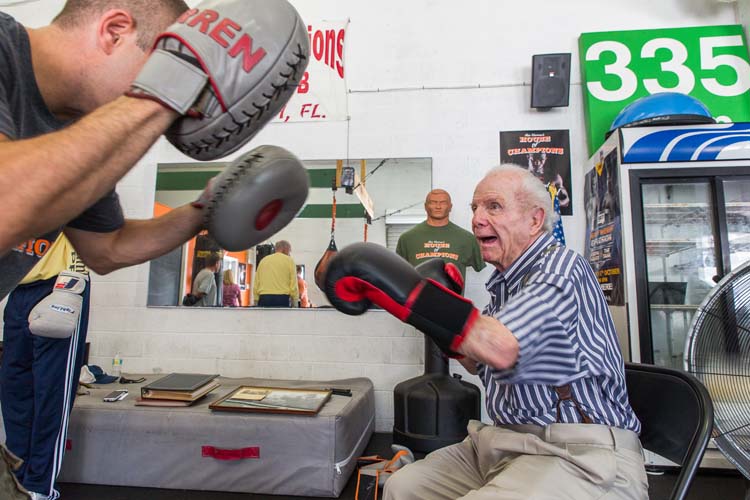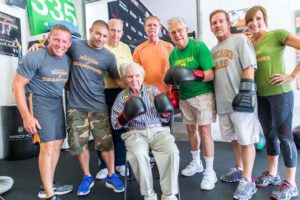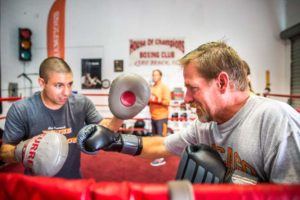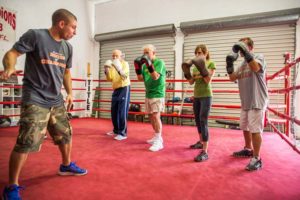
If you were asked to make a connection between Parkinson’s disease and boxing, you’d likely think of the late, great Muhammed Ali and his long struggle with the disease. But a national program called Rock Steady, which has found a home right here in Vero Beach, is connecting boxing to Parkinson’s in a much more positive and hopeful way.

Dr. Joe Shafer, Gus Curren, Paul Barkwell, Terry Gardner, Tom Hamilton, Crawford English, Macy Curren and Gil Davis (seated).
The Rock Steady Boxing program has its roots in decades-old research on the benefit of exercise for movement, flexibility, posture and gait – things that are often a struggle for those with Parkinson’s, a chronic and progressive disorder caused by the death of neurons in the brain that control movement and coordination.
The research found that specific types of rigorous exercise – with an emphasis on balance, core strength, rhythm and gross motor movement – could be of value to Parkinson’s sufferers. This is where Gus Curren, a highly-regarded trainer of both amateur and professional boxers, comes in.
Curren has owned the House of Champions Boxing Club & Gym in Vero for over two decades. In July, he and his wife Macy attended a two-day training camp on the Rock Steady method and learned its specific boxing-related workout techniques.
They also learned about Parkinson’s and why the method is widely accepted to be “neuroprotective,” meaning it can actually slow the progression of the disease by increasing the delivery of oxygen and neurotransmitters to various parts of the body, including the nervous system.
Gus and Macy are now certified to teach the Rock Steady method to people with Parkinson’s. They already have a half-dozen trainees (whom they call “Parkinson’s Boxers”) enrolled in the three-day-a-week program. Macy says, “Each session is somewhere between 60 and 90 minutes, and in addition to the health benefits, the boxers have a lot of fun.”

Gus Curren (L) spars with Crawford English
There is, of course, no combat involved in the workouts, but there are many activities anyone who has seen even one “Rocky” movie will be very familiar with – including stretching exercises, punching of heavy bags, jabbing of speed bags, and training on “focus mitts” (a padded target attached to a glove). There are also jump ropes for those Parkinson’s boxers who may be feeling a little more adventurous.
Other forms of exercise can be beneficial to those with Parkinson’s, but none is the complete package that boxing training is. Lap swimming, for example, helps with muscle strength, but it does not improve balance or force the participant to produce a variety of movements. Boxing training, with its rhythms and body rotations, does that and more.
Dr. S. James Shafer, a Vero Beach neurologist, is an advocate of the Rock Steady program; the first Parkinson boxers being trained at the House of Champions are his patients. He says the improvements seen as a result of the boxing training may allow the dose of any prescribed medications to be reduced. This is important, as resistance to Parkinson’s drugs can sometimes occur; over a period of time, they can become less effective or stop working altogether. If a lower dose is given, the risk of this resistance is lowered.

Gus Curren instructs Paul Barkwell, Tom Hamilton, Macy Curren and Crawford English
Rock Steady Boxing was founded in 2006 by an Indiana attorney named Scott Newman, who was diagnosed with early-onset Parkinson’s at the age of 40. He began intense boxing training a few years after his diagnosis, and saw a dramatic improvement in his physical health, agility and daily functioning. Wanting to share his success, Newman created the Rock Steady program based on his personal experience.
At the House of Champions, each Parkinson boxer is assessed and assigned a “level” from 1 to 4, which allows for the training program to be customized to their individual needs. Gus says, “We can help everyone, no matter their age, gender or the stage of their disease. We are working with boxers at all levels, including one who uses a wheelchair much of the time.”
Gus Curren’s House of Champions is located at 4378 U.S. 1 in Vero Beach. The phone number is 772-770-0262. Gus and Macy are currently offering a free lesson to those interested in the Rock Steady Boxing Program.
Dr. Shafer sees patients and conducts research at the Vero Beach Neurology and Research Institute, located at 1040 37th Place, Suite 201, in Vero Beach. The phone number is 772-492-7051.



